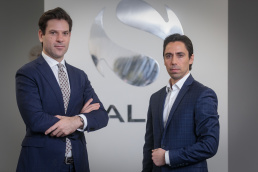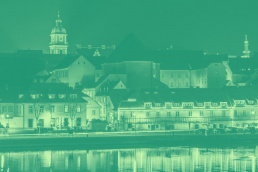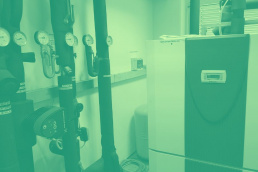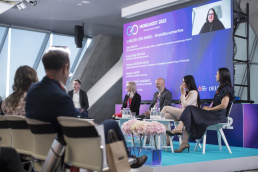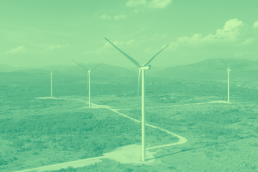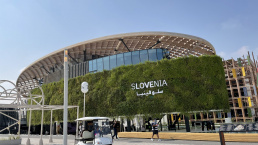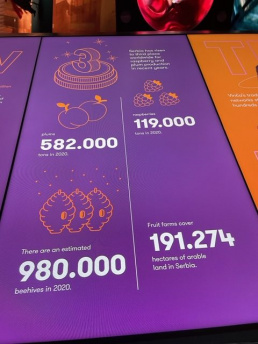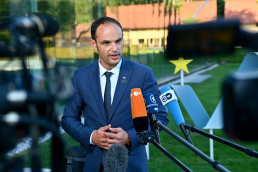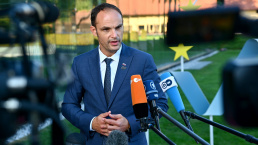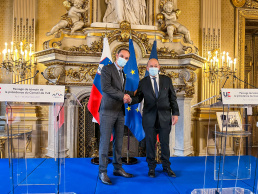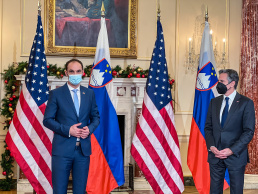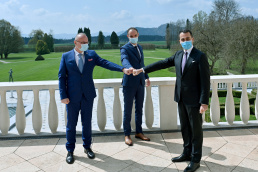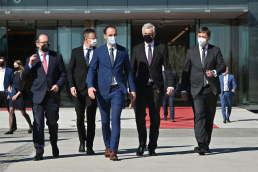Pharma Distributors: The Vital Link Between Manufacturers and Patients
Value-Added Services
Value-Added Services
editor
Barbara Matijašič
JOURNALIST AT THE ADRIATIC
The pharmaceutical industry has a significant impact on how people obtain the prescription and over-the-counter medical products, dietary supplements and medical devices. If we simplify, the process of ensuring that medications are delivered to patients begins with R&D manufacturing, followed by distribution, consumption and waste management – these steps are intertwined and can’t work without proper storage, distribution and value-added services such as focused marketing.
In our region, pharma distributors provide about 55 million people with safe and rapid access to medicines and medical services. By itself, this places them at the heart of health systems. They act as the unseen but crucial link between pharmaceutical manufacturers, hospitals, pharmacies and last but not least – the patients. As popular in other industries as well, also pharma strategists classify countries into clusters, with clusters serving as the focal point for searching for the best local solution provider.
A broader economic situation namely influences some markets today in a way to be more favourable to pharmaceutical manufacturers than others. In recent years, an increasing number of pharmaceutical companies have opted for the business model of external distributers – as opening of a representative office sometimes is not justified by commercial interests. This transition of business is becoming a popular model in our region as well. It, of course, comes with opportunities as well as challenges and we talked about these with Žiga Hieng, the Chairman of the Board of Salus Group, and Gregor Žgur, the General Manager CARSO Pharm as both companies enjoy a strong regional presence and extensive experience in the territory.
The Salus Group is present in Central and East Europe (CEE) and is at the moment operating in 13 different countries, among them in Slovenia, Croatia, North Macedonia, Serbia and Montenegro, as well as in Romania, Bulgaria and in the Baltics. Salus Group services includes regulatory and pharmacovigilance, market access, distribution, marketing and sales, medical support, and distribution, while CARSO pharm specialized in Rx, OTC and MD representations is constantly expanding their business and services offered in the CEE region. From an organizational perspective, CARSO pharm is structured into three separate sectors each of them is supporting specific lines of business pharmaceuticals, medical devices, OTC and food supplements to foster best client support. “In Salus Group, we conduct business both in EU and non-EU countries. Regulations in EU countries are very similar in all the service areas we provide, and local differences from one EU country to another are very small,” comments Žiga Hieng, the Chairman of the Board of Salus Group when asked how individual markets differ from each other. “On the other hand, we enjoy a strong presence in Serbia, North Macedonia, Montenegro, Bosnia and Herzegovina, Albania and Kosovo. These non-EU countries have different laws and regulations related to distribution and commercialization services. Our success in these markets is directly related to the deep local knowledge provided by our experienced domestic colleagues, and to our inclusive and connected culture, which can transfer local knowledge to regional colleagues and vice versa.” “Our strong suit is that we operate by the principles of major international companies and provide comprehensive services in Central and Eastern Europe through its internal policies. We act as outstretched hands where Partners can choose a complete representative or only a partial representation of the product depending on their needs,” explains Gregor Žgur, the General Manager CARSO Pharm.
“In Salus Group, we conduct business both in EU and non-EU countries. Regulations in EU countries are very similar in all the service areas we provide, and local differences from one EU country to another are very small,” comments Žiga Hieng, the Chairman of the Board of Salus Group.
The Future Emphasizes The Rise of Breakthrough Medical Solutions and Value-Added Services
“COVID has had a significant impact on people’s overall access to health care and well-being, so our responsibility is also to introduce solutions that help close the gap between current health care and ideal one,” stresses Gregor Žgur, the General Manager CARSO Pharm.
The Main Challenges for 2022
THE ADRIATIC
This article was originally published in The Adriatic Journal: Strategic Foresight 2022
If you want a copy, please contact us at info@adriaticjournal.com.
Managers’ Health: Risk Factors
Health and stress
editor
Barbara Matijašič
JOURNALIST AT THE ADRIATIC
Work overload and stress are familiar drivers of burnout and other health problems in managers. In a 2005 survey assessing the health of Slovenian managers, Prof Dr Metoda Dodič Fikfak (Head of the Clinical Institute of Occupational, Transport and Sports Medicine, which monitors and researches occupational diseases) found that almost a quarter of managers did not feel well, and one third devoted almost no or very little time to their health and well-being.
“Female managers become ill more often than their male colleagues, with the risks for both sexes being related to bad habits such as cigarettes and alcohol,” says the expert. The middle management is particularly exposed to health risks, trapped between pressures coming from superiors and those arising from managing subordinates. All this is even more pronounced in times of crisis, including the corona crisis, which has resulted in increased volatility, uncertainty, complexity and ambiguity in work environments.
The key is changing one’s lifestyle
Willingness to sacrifice and strong goal orientation are typical personality traits of managers. These characteristics can help overcome obstacles but can often lead to negative consequences such as stress, overwork, burnout and other health problems. It is essential to distinguish between challenges, or positive stress, which makes us better, and negative stress, making us ill.
The key is to adopt preventive measures early enough, such as changing one’s lifestyle. However, it is (unfortunately) much more common that radical changes have to be introduced after health is already compromised. The initial step is changing one’s mindset: every manager has to accept that everyone is replaceable. Next, boundaries have to be set – for oneself and others. Many managers do not have time to think about their well-being and health, and many avoid these issues altogether. That is until they find themselves in a difficult, life-altering situation that can endanger their health or even their lives and thus affect the future of their loved ones.
Health creates added value
Attending to one’s well-being in both personal life and the workplace is reflected in greater life satisfaction and work efficiency. Given the current trends and the environment we live in today, it is wise to take precautions against possible negative consequences. This is easier to do if you have a reliable health partner by your side. The Health Point (Zdravstvena Točka) assistance centre at Triglav health insurance company or Triglav Health (Triglav, Zdravstvena zavarovalnica) offers not only information on insurance and health service providers, but their team can help you obtain the consent of the insurance company for the provision of health services, and assist in you exercising your insurance rights. As a Triglav Health customer, you can contact Health Point on a toll-free telephone number all year round. Medical experts will find the right health care provider for you in any situation and arrange everything necessary to carry out the treatment.
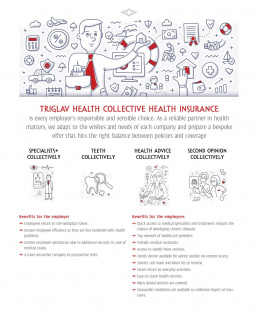
THE ADRIATIC
This article is part of The Adriatic: Strategic Foresight 2022 project.
If you want a copy of our annual magazine, please contact us at info@adriaticjournal.com.
Expo 2020 Is About the Future
The World's Fair in Dubai
editor
Tine Kračun
EDITOR IN CHIEF
Never mind its unfortunate fate of bearing the name of the preceding year – EXPO 2020 is in fact all about the future. Just as its host Dubai – once a small town in the dessert, where flights stopped on their way from Europe to Southeast Asia and Australia to fill up their tanks with cheap gasoline, of which there still is an abundance in the Emirates.
The locals (the population grew from 100,000 in 1971 to just below three
million in 2021) figured they could sell more than just gasoline to the odd bypassers: large duty free shops opened and “Fly, Buy, Dubai” soon became much more than just a slogan. It became a vision for the future, just as the vision for the future is the theme of the EXPO 2020 pavilions – 193 countries have representation at the exhibition.
SLOVENIA STANDS SMART AND GREEN
As per the size of the country, the position of the Slovenian pavilion right at the entrance of the Sustainability section goes on par with its motto “Green and Smart Experience”. A mishmash of business and tourism holds value for the future, a common theme across many other pavilions. Slovenia took the business side seriously. As one of only 17 pavilions that include a business aspect in their offering – Slovenia holds an event almost every day. “The plan is to really enhance the business cooperation – between Slovenia, the Middle East and everyone that comes here”, says Matic Volk, the young and energetic Commissioner who is acting as an exemplary host to all the delegations that attend the conferences, host events or just one-on-one meetings – all of which takes place on the second floor of the pavilion.
“The pavilion highlights three elements that set Slovenia apart: Water, the source of life and vitality, the interflow of materials and ideas; Nature, connecting the Earth with the Universe, knowledge and innovativeness, and Slovenia’s green and clean heart; and Innovativeness, represented by a giant wooden sunshade, our shield and shelter, a technological masterpiece of construction and design illustrating Slovenia’s strong identity. The pavilion construction innovatively includes prefabricated, sustainable and biodegradable elements of metal, glass, wood and stone.”
THE ADRIATIC COUNTRIES AT THE EXPO
SERBIA INTERCONNECTS THE PAST WITH THE FUTURE
The story at the Serbian pavilion, which is smaller than Slovenia’s but larger than all the other countries’ from the Adriatic region is about the past and the future. Drawing parallels between the trade practices of the late Neolithic community Vinča and today’s trends, modern Serbia presents itself with the slogan “Creating ideas”, which shows Serbia as a progressive economy open to foreign visitors, both business and tourists. They will have the opportunity to learn and prosper on the vision that Serbs from the past – such as Nikola Tesla – had on the future.
BIH AND NORTH MACEDONIA BET ON NATURE
At the Sustainability section you will also find the pavilions of Bosnia and Herzegovina and North Macedonia. Both draw on their cultural heritages presenting a strong and rich history together with a beautiful environment. At the North Macedonian pavilion visitors can admire stuffed Eagles and Cats – largest in the world. Both countries emphasise their location attractiveness for businesses with Bosnia and Herzegovina displaying its connections as the hub between Europe and the Middle East, while North Macedonia focuses on its competitive taxation rates and subsidies it offers to foreign investors.
CROATIA GOES FAST
The Croatian pavilion may not be the largest but it is certainly the fastest. Rimac is the fastest car in the world, going up to 400 km/h and accelerating to 100km/h in just two seconds. There is no need to point out it is 100% electric. It is only natural that the Croatian pavilion will also feature stories on their Adriatic coast – one of their greatest attractions for people from all over the world. Not surprisingly and seen before, the video presentation is about the rich Croatian past as the cornerstone for the future.
THE FUTURE IS YOUNG IN KOSOVO
You will find the pavilion of the youngest country from the region – Kosovo – in the Mobility section. And while other countries draw strongly on their historical heritage, Kosovo does just the opposite – with its focus being on their youth, they draw the comparison between innovation and the beauty of their land.
THE ADRIATIC
This article was originally published in The Adriatic: Strategic Foresight 2022
If you want a copy, please contact us at info@adriaticjournal.com.
Bringing the Best to Society
5G
editor
The Adriatic in partnership with Telemach
The next-generation of mobile networks brings unprecedented opportunities for development and progress.
What can a 5G mobile network do for its users? This is a question posed by professionals and laypersons alike; it stirs the imagination. The future will provide the exact answer. In the meanwhile, it is already clear that 5G delivers higher speeds, improved responsiveness and more bandwidth.
For consumers, the new generation of mobile technologies represents an evolution. The things they can do on their smart device already, with the help of 5G, will be done faster, more efficiently, and with extended capabilities. But the endless possibilities offered by 5G will be much more felt by businesses. We will see a revolution in machine connectivity with the Internet of Things at the heart of the next-generation mobile network. The significantly higher speeds enabled by 5G will result in minimal latency, which is a very important factor when it comes to communication between different devices, i.e. the Internet of Things (IoT).

This will drive the development of smart industry, agriculture, and communities as a whole. Together with the Internet of Things, 5G technology can improve energy efficiency, reduce greenhouse gas emissions and drive more efficient use of renewable energy. It can help reduce air and water pollution, reduce food waste and protect wildlife and the environment.
As to public safety, 5G brings advantages to firemen and rescue teams, making it easier to fight fires, rescue people from mountains and even locate missing people or pets. It also enables the digitalisation of healthcare services, remote patient treatment and specific complex solutions such as remote diagnostics, remote consultations and remote surgeries. The benefits of 5G will be felt across all aspects of our lives.
The roll-out of 5G in the economy will be gradual. However, in a few years, we can expect an explosion of activity we haven’t seen in a long time.
“5G is, or will be, a powerful driver of digital transformation. It is the first mobile communications system that is not primarily designed for people but is machine-centric. It will revolutionise machine-to-machine connectivity and put Internet of Things at the heart of the nextgeneration mobile network,” says Zoran Vehovar, Chief Technology
Officer at Telemach.
TELEMACH IS THE FIRST TO DELIVER A TRUE 5G EXPERIENCE
The benefits of 5G will be felt across every aspect of our lives and in Slovenia, Telemach was the first to introduce a gigabit network with a true 5G experience. At the end of 2021, its 5G network is already available in more than 50 major cities across Slovenia and the company is accelerating its roll-out. “We’re building the 5G network aggressively. We want to make the most of the frequencies we have bought atauction, as quickly as possible. We are deploying additional equipment everywhere and have far exceeded our original plans for this year. We’ve accomplished much more than we had planned at the start,” Vehovar adds.
This is helping the company to rebuild its technological foundations, create a competitive advantage and respond to the increasing demand for faster network speeds and bandwidth. 5G speeds can be enjoyed by all Telemach users, as access to 5G networks is included in all bestselling VEČ mobile plans! Trusted by more than 620,000 satisfied customers, Telemach remains the fastest growing mobile provider in Slovenia focused on continuous upgrades and the provision of high-tech, high-quality and stable services.
THE ADRIATIC
This article was originally published in The Adriatic: Strategic Foresight 2022
If you want a copy, please contact us at info@adriaticjournal.com.
We Can Adapt and Be an Active Partner
Anže Logar, Minister of Foreign Affairs of the Republic of Slovenia.
editor
Jan Tomše
EXECUTIVE EDITOR AT THE ADRIATIC
What is important for the Western Balkans region now is the implementation of the Common Regional Market. If the Open Balkans initiative could give impetus to the implementation of the Common Regional Market, it would be good for the region, says Dr Anže Logar, Minister of Foreign Affairs of the Republic of Slovenia.
With Anže Logar, Minister of Foreign Affairs of the Republic of Slovenia, we talked about the achievements of Slovenia at the helm of the EU in the second half of 2021, today’s global challenges, and the Western Balkans’ opportunities and challenges in 2022 and beyond.
Slovenian presidency of the Council of the EU: which are the achievements the Slovenian diplomacy takes pride in, even though they might have occured outside media limelight?
The Slovenian Presidency of the Council of the EU is marked by dynamic developments in Europe and beyond. The uncertain epidemiological situation continues, and the world is facing several unexpected events – from the crises on the Belarus border and in Afghanistan, to new geostrategic alliances such as AUKUS – which called for a swift and determined reaction by the Presidency, all the while seeking consensus and demonstrating European unity.
Holding the Council Presidency entails complex legislative work as well as striking a balance between member states and the three European institutions – the Council of the EU, the European Commission and European Parliament.
At the outset of the Slovenian Presidency, we managed to seize the window of opportunity opened by the legislative procedure and a period of relatively limited spread of the pandemic, achieved progress in the long and tiring negotiations, which had not really been anticipated, and successfully completed the work on 20 legislative acts.
Furthermore, we stepped up the work on establishing the European Health Union that would facilitate member states’ dealing with transboundary health emergencies. We successfully concluded the negotiations on extending the mandate of the European Medicines Agency (EMA) and the strengthening of the European Centre for Disease Prevention and Control. Another important achievement is the agreement among Member States on the European Health Emergency preparedness and Response Authority (HERA).
A major success of the Slovenian Presidency are the endorsements by the member states of the Digital Services Act and Digital Markets Act, which lay down new rules for a safer and more open digital space.
As the country holding the Council Presidency, Slovenia coordinated the EU’s mandate for participating in the COP26 climate summit in Glasgow, where – together with the European Commission – it represented the EU in the negotiations with third countries. COP26 is an important step forward, keeping within reach the goal of the Paris Agreement to limit global warming to 1.5°C.
In foreign policy activities, I would like to point out the successful organisation of the EU-Western Balkans Summit on 6 October. It was attended by all the EU and Western Balkans leaders, who adopted the Brdo Declaration. It is particularly important that the EU reaffirmed its commitment to the enlargement process, and the Western Balkan partners reaffirmed their dedication to European values and principles and the need to implement the necessary reforms. The leaders also agreed to hold regular summits, with the next one to take place during the Czech Presidency.
We had invested a great deal of effort in the drafting of Council conclusions on enlargement and the stabilisation and association process, which were unanimously adopted by the General Affairs Council on 14 December and represent an important milestone in the process. Another notable achievement is the opening of Cluster 4 in Serbia’s EU accession negotiations (chapters on environment and climate change, energy, transport and Trans-European Networks).
Which are the main global challenges of today? More concretely, which are the main international challenges the EU is facing?
The world is facing challenges which were inconceivable only a decade ago: the COVID-19 pandemic, climate change, hybrid threats, cyberattacks, and new geopolitical divisions dictating that the existing multilateral system be upgraded with effective mechanisms. Another major challenge are the developments in the South China Sea; part of the attempts at addressing this issue is the EU’s Indo-Pacific Strategy. The occupation of Crimea continues, and the Russian Federation is massing military forces on the border with Ukraine, which is openly concerned for its safety. Other causes of concern include the rising energy prices and the question of strategic autonomy.
In multilateral forums, we can perceive growing polarisation between the democratic and non-democratic parts of the world; the concepts agreed decades ago and the “language” of the key rules governing the multilateral system are being eroded; new concepts undermine international frameworks and the human rights system. The instrumentalisation of international forums with various tactics, manoeuvres and procedures by the increasingly numerous and powerful autocratic regimes is causing further divisions and, consequently, undermines the efficiency and credibility of international organisations. The good news in this context is the US’s return to multilateral forums.
Slovenia is also striving to strengthen the EU’s common foreign and security policy and transatlantic relations, which is vital for resilience on both sides of the Atlantic and the best guarantee for enhancing the EU’s position.
How much international visibility and soft power has Slovenia built up? Where do you see Slovenia’s strong points, and which are the European strategic decisions that Slovenia, as a country, has a say in?
It is very simple: Slovenia has more clout now than a year and a half ago, and yet still not as much as it could have, given its international engagement, geostrategic position and state characteristics.
At the national level, we strive for reaching consensus when it comes to our fundamental foreign policy orientations. Therefore, during this mandate, we embarked on a review of our foreign policy strategy. After more than a year of intensive work within the Ministry and within the Strategic council of experts, we now have an updated document providing appropriate responses to contemporary challenges.
Slovenia is also striving to strengthen the EU’s common foreign and security policy and transatlantic relations, which is vital for resilience on both sides of the Atlantic and the best guarantee for enhancing the EU’s position.
In this regard, Slovenia endorses the strengthening of EU-NATO relations and of the EU’s resilience to hybrid threats, in the field of cybersecurity, military mobility, civil-military cooperation during crises and interoperability, as well as the institutionalisation of contacts between the two organisations. Resilience as a priority of the Slovenian Presidency enjoys wide support. In keeping with the Global strategy for the foreign and security policy of the European Union and the EU’s ambitions, Slovenia is actively involved in the process of drafting the Strategic Compass and is reaffirming its reputation as a credible, active and visible member state. The numerous successful Slovenian candidatures in international organisations in the last year are yet more proof that we are on the right track.
During the COVID-19 pandemic, Slovenia has proved its solidarity with developing countries; since 2020, it has allocated a total of EUR 5.2 million to help them fight the coronavirus. With a total of over two million doses of COVID-19 vaccines donated, it is one of the largest donors per capita.
THE REGION
How stable a region is the Western Balkans at the moment? Regarding its European perspective, was there any meaningful progress achieved during Slovenia’s EU Council presidency?
The situation in Bosnia and Herzegovina causes concern, particularly the deepening political and institutional crises. We support the internal political dialogue and the constructive initiatives and debates focused on helping the country and encouraging progress on its path towards the EU, as this is in our common interest. We are resolute in our calls for ending the divisive rhetoric, establishing functional institutions and continuing the reform process. Slovenia supports the unity, sovereignty and territorial integrity of Bosnia and Herzegovina.
The normalisation of Serbia–Kosovo relations also remains a major regional issue. A comprehensive and legally binding agreement must be reached, and it must cover the entire spectrum of outstanding issues.
Stability and sustainable development of the Western Balkans are in our vital strategic interest as the region lies in our immediate neighbourhood.
In the final weeks of its EU Presidency, Slovenia has endeavoured to find a solution that would enable the launch of accession negotiations with North Macedonia and Albania. Along with the EU-Western Balkans Summit and the participation of Western Balkan partners in the debate on the future of Europe, the conclusions of the December GAC on enlargement raise hope for future enlargement steps.
When speaking of the Western Balkans, we cannot ignore the issue of succession. For Slovenia, the full implementation of the Agreement on Succession Issues is of vital importance as it implies respect for the rule of law in the context of fulfilling the assumed international obligations. Slovenia has repeatedly pointed this out, including at the European level, most recently at the EU-Western Balkans Summit.
Countries of the Western Balkans are actively pursuing tighter integration with the EU common market. How do you see the Open Balkans initiative, announced a few months ago, that currently includes three countries – Serbia, North Macedonia, and Albania?
To boost the economic development of these countries, it is imperative that we strengthen connectivity between the EU and the region in transport, energy, digitalisation, sustainable development, environmental issues and green technologies.
In October 2020, the European Commission published the Economic and Investment Plan for the Western Balkans, which includes €9 billion from the pre-accession instrument. In addition, the Western Balkans countries will be given access to the Guarantee Facility and the European Fund for Sustainable Development Plus, which will enable them the opportunity to take out favourable loans. A nice detail I would like to mention – in my capacity as Slovenia’s high representative for relations between the Council and the European Parliament during the Slovenian Presidency of the Council of the EU, I joined President of the European Parliament David Sassoli in signing the agreement that enables the drawdown of these funds.
What is important for the region now is the implementation of the Common Regional Market (CRM). If the Open Balkans initiative could give impetus to the implementation of the CRM, it would be good for the region.
There are many areas where this kind of cooperation could accelerate the region’s inclusion in European business flows, among them regional trade, investment cooperation, digitalisation to include the Western Balkans in the European digital single market and regional cooperation in industry and innovation.
All this would bring tangible benefits for the business world and citizens of the Western Balkan countries as they advance on their European path.
What is the security situation in the region? How can Slovenia, which is both a EU member state and knows the region, contribute towards improving security in the region?
The Western Balkans are still faced with divisions and outstanding issues, the legacy of the traumatic experiences in the recent past, particularly during the dissolution of the SFRY. It is vital to achieve reconciliation, and improve neighbourly relations.
If this goal is to be met, the countries need economic development and discernible benefits for the people, brought about by the reforms that need to be implemented as part of their EU accession negotiations.
LOOKING INTO 2022
How successful has Slovenia been in taking advantage of its geopolitical potential as a centrally located EU country, and a bridge between the stable Western Europe and the less stable East?
The division into a stable West versus an unstable East sounds like a cliché. If you look at the political situation in the countries in the East of the EU, you can see that their governments are usually stable and their political agendas concrete. They also experience high economic growth. Nonetheless, the unification euphoria we witnessed after the fall of the Berlin Fall has faded, some unfulfilled promises and expectations have led to disappointments that have cooled relations, and the economic and health crises have further worsened the situation.
In my opinion, Slovenia’s advantage lies in its agility; it can adapt to new situations and knows how to be an active partner. It was this realisation that encouraged us to update the strategic document of Slovenian foreign policy.
If the Open Balkan initiative could give impetus to the implementation of the CRM, it would be good for the region.
As Slovenia’s Minister of Foreign Affairs, where do you see the main challenges facing the Western Balkans as a region? How can economic diplomacy help?
Stability is a key challenge, particularly when it comes Bosnia and Herzegovina and normalisation of relations between Serbia and Kosovo. The continuation of the enlargement process with Albania and North Macedonia – in the package – is also of utmost importance. This is a most quickly achievable goal, a positive message the EU could convey to the region. Progress on these three issues would have a positive practical impact on improving the economic situation. However, it is also true that entrepreneurship, which is inherent to the people of Western Balkan countries, puts pressure on the political leadership to find solutions. And we should use this leverage to greater advantage.
Another important topic is the promotion of economic cooperation with the region. We know from our own experience the major role that international trade and foreign investments play in the transformation of countries in transition. At the end of 2020, Slovenian companies held €2.5 billion of investments in the Western Balkans, which is more than one third of all Slovenian outward investments.
From the standpoint of economic diplomacy, where are the biggest challenges, and opportunities, for Slovenian exporters seeking new market niches? We know that corporations have already started to shorten their supply chains, or put differently, to relocate production into geographically nearer countries with more stable business partnerships.
The answer is very simple: increasing added value, and achieving better positioning in supply chains. For this to be achieved, we need further investment in research and development. I see one of the opportunities in the EU recovery and resilience fund, which – with additional funds for a green and digital transformation – will give the Slovenian economy comparative advantages in the relatively large Western Balkan market.
Economic diplomacy has long been striving to bring Slovenian and foreign scientific or research institutes together, and connect them with innovative Slovenian companies with high added value.
In your opinion, which is the single biggest opportunity that Slovenian exporters still haven’t taken advantage of?
This depends on the market they want to export to. The European market is subject to market competition rules – the better they perform, the more they invest in the international network of contacts, and the more products with high added value they develop, the greater the chance of success. At the same time, it is worth considering some of the more closed or remote markets. This is where economic diplomacy can significantly contribute to strengthening bilateral trade. And that is why, during this mandate, we have intensified our activities in opening diplomatic missions and consular posts in the regions and continents where we had not previously been present, because such presence can play a significant part in entering into economic agreements.
Would you like to point to any outstanding goals you intend to fulfil during this mandate?
When I became Minister of Foreign Affairs back in March 2020, I set myself a very clear goal: to strengthen Slovenia’s activities in the European and international arenas. We at the Ministry have been working in this spirit for the past two years. Despite the challenging circumstances related to the COVID-19 pandemic, I participated in all major international forums in person or virtually, we carried out 61 bilateral visits abroad, and welcomed 43 foreign ministers and high-level guests to Slovenia. As I have already mentioned, we set up an informal C5 group, were invited to join the EU Med Group (formerly MED7) following extensive diplomatic efforts, established a permanent dialogue with Italy and Croatia on the management of the Adriatic Sea, relaunched and significantly strengthened transatlantic relations, established a strategic dialogue with the US, and carried out the Presidency of the Council of the EU. We also opened 3 new embassies (Dublin, Seoul and Riga) and a consulate in Milan to improve the representation of Slovenia abroad. All in less than two years. This is what we call “active diplomacy”. Diplomacy that does not limit itself. I am proud of our diplomacy because it has put Slovenia back on the map of countries that can make a difference at the international level.
Are we going to stop here? Certainly not. In 2022, we will continue to expand our diplomatic network by opening at least one more embassy. We have also decided to present a candidature for a non-permanent seat on the UN Security Council for the 2024–2025 term. We will continue to engage in active diplomacy and make effective use of the resources we set up for the Presidency of the Council project. We are not only strengthening our presence within the UN system, but also our dialogue with all of the key global players, including the countries that are particularly important for the Republic of Slovenia and its foreign policy and economic interests. I therefore see no reason to stop!
THE ADRIATIC
This article was originally published in The Adriatic: Strategic Foresight 2022
If you want a copy, please contact us at info@adriaticjournal.com.
A Plot of Your Own
Local food
editor
Špela Bizjak
JOURNALIST AT THE ADRIATIC
Food self-sufficiency matters for the development of regions and countries. Organically-grown food has become a privilege.
Self-sufficiency can be considered a part of our daily routine, and a step towards a better life – one in which we take full responsibility for what we do. Moreover, self-sufficiency can bring us joy in our own productivity. Our farming ancestors ate what they could produce. Looking back in history, people were self-sufficient in water, food, and energy. Those who were not became extinct. So, it appears there still exists a very strong link between self-sufficiency and survival, despite all the opportunities created by global trade.
With an ever-faster pace of life, we demand to have everything at our fingertips, including – it goes without saying – fresh fruits and vegetables on supermarket shelves. At a time of COVID-19, everybody is thinking about people they care about. These should also include all those farmers who actually grow the food that lands on our plate, and all those involved in food processing and supply chains.
Farmers’ and bourgeois cuisine
While Slovenian towns were early hubs of trade and well-stocked with varied provisions, in the countryside, they only ate what they produced themselves. They cooked and baked on open fireplaces or in bread ovens. Cereals (wheat, millet, oats, rye, buckwheat, and, later, corn) served as staple foods. Cabbage and turnips were the most common crops while lentils and beans were the least.
Meat consumption in Slovenia decreased significantly in the 18th century. Potatoes began to be cultivated in the middle of the 19th century (after the great hunger of the 18th and 19th centuries). As for the rural population, their daily diet was a repetitive pattern weaved out of porridge, bread, milk, cabbage, and turnips. It was different during holidays, though, when they would eat stronger dishes seasoned with cured pork, and other delicacies enjoyed to this day. The oldest known recipes for a Slovenian dish are from 1589, from the court kitchen of Charles II. Apparently, the emperor was fond of the Carniolan cheese soup and of Carniolan štruklji with tarragon filling.
Food without packaging waste
Normally, there was no food-related waste in history. Townsfolk usually went shopping on the local marketplace with a wicker basket and carried canvas bags on them. But in the countryside, they had much less time for food preparation than in the city. On farms, housewives often had to join in working the fields, especially in summer, which is one of the main reasons why bourgeois and peasant menus were so different. Farmers served better meals only when they wanted to show off hospitality in front of guest.
The oldest known recipes for a Slovenian dish are from 1589, from the court kitchen of Charles II. Apparently, the emperor was fond of the Carniolan cheese soup and of Carniolan štruklji with tarragon filling.
The rising importance of local food
Even though many local traditions of self-sufficiency appear to be waning in today’s food production, a few cases to the contrary deserve to be emphasised. Say, Mercator, one of the region’s most important retailers of fast-moving consumer goods. Mercator’s primary mission has always been to offer consumers what they wanted and needed. Most customers want local offerings, home-made products that they know and trust. Locally made food has an important place in Mercator. This is why the retailer also encourages smaller producers and family farms to develop products with high added-value for customers.
Initial cooperation with smaller suppliers was so successful that Mercator has recently added another 60 products to an existing offering of 1,400 under the umbrella brand Radi imamo domače (“We love the local”). The product lines covers everything from milk and dairy products, meat, home-made juices and syrups, sweet snacks, mill products, jams, and honey, and is available on the shelves of more than 250 Mercator stores across Slovenia.
With a diverse and reliable offering of Radi imamo domače products, Mercator wants to increase both the standing of the joint brand and the position of smaller manufacturers. Above all, they want to reach even more customers who prefer to buy local.
THE ADRIATIC
This article was originally published in The Adriatic: Strategic Foresight 2022
If you want a copy, please contact us at info@adriaticjournal.com.
The World in Four Maps
Health and stress
editor
Jure Stojan, DPhil
ASSOCIATE EDITOR
“What we do see depends mainly on what we look for. ... In the same field the farmer will notice the crop, the geologists the fossils, botanists the flowers, artists the colouring, sportsmen the cover for the game. Though we may all look at the same things, it does not all follow that we should see them.”
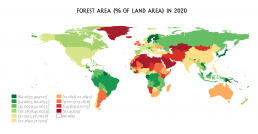
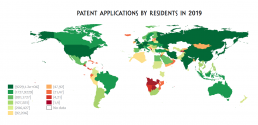
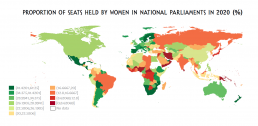
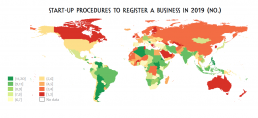
THE ADRIATIC
This article was originally published in The Adriatic: Strategic Foresight 2022
If you want a copy, please contact us at info@adriaticjournal.com.
Energy Fit for the Future
Challenges for the economy in light of the green transition
editor
Adriatic team
Institute for strategic solutions is organizing a discussion event on current issues related to the green energy transition: presentation of views and discussion by key stakeholders on current economic issues in the implementation of the green energy transition.
The purpose of the event is to present a view of Slovenia’s energy challenges, especially in the field of green energy transition in the economy. The fact is that after the corona crisis the European economy is moving towards a green energy transition. Companies will have to adapt their business models to this, because regulations and at activities at all other levels are focused on assessing whether companies are energy fit for the future.
The event will be held in House of the EU in Ljubljana, on February 15, 2022 at 10 AM.
Online registrations are required HERE
We have also enabled you to follow the event live online down below. Tune in on Tuesday, February 15.
Course of the event
10:00 – 10:05
Greetings from the host:
Jerneja Jug Jerše, Head of the Representation of the European Commission in Slovenia
10:05 – 10:25
Introductory speeches:
o Representative of the Ministry of Infrastructure of the Republic of Slovenia: Blaž Košorok, State Secretary
o Representative of the European Commission: Robert Kaukewitsch, Team Leader in the Renewables and Energy System Integration Policies
o Representative of EBRD: Vincent Duijnhouwer, GECA Associate Director
10:25 – 11:10
Presentations of invited speakers:
o Petrol representative: Jože Bajuk, Member of the Management Board
o SIJ Acroni representative: Branko Žerdoner, General Manager
o SSH representative: Dejan Božič, expert director for energetics
11:10 – 12:00
A discussion table with all speakers moderated by Tine Kračun, Director of Institute for Strategic Solutions
A few Tips and Tricks from Slovenian Executives
How to navigate in 2022
editor
Jan Tomše
EXECUTIVE EDITOR AT THE ADRIATIC
According to projections, 2022 will be a demanding and turbulent business year. In the shadow of the economic growth and inflation uncertainties, the managers will have to decide wisely about the supply chain challenges, lie in wait for the most suitable talents they want to attract, and try to reimagine their business models. Not to mention the challenges that may emerge from the tighter access to funds should the central banks decide to impose stricter monetary policy.
We asked some of Slovenia’s top managers what should managers focus on in 2022 in order to effectively lead their teams and tackle the challenges in the rapidly-changing business environment.
Closely monitor the key areas. Closely monitor the business, decision-making and the social environment to understand the changes and risks and develop various scenarios for the future of your business.
Manage your costs and take care of your supply chains. Control the prices of raw materials and energy sources. Establish secure and reliable supply routes.
Invest even more in digitalization and automation. As these investments may seem incosistent with the premise of cost control, you will capitalize on them in the long term.
Make your business a pleasant place to be. Build work environment that encourages creativity, good relationships, and flexibility.
Be open-minded, learn constantly. Develop preparedness for the jobs of the future. Promote life-long learning. In the fast-changing times and digitisation, work processes constantly change. The never-ending investing in new knowledge, skills and experience is the prerequisite for preparedness for the jobs of the future.
Feedback. Try to get it regularly, so you know where to focus your efforts.
Practice agility. The pandemic era sparked a stream of uncertainties, that demand adaptation and quick decision-making and imposing changes.
Delegate wisely. You can’t do everything yourself – show your employees that you trust them by delegating accordingly.
Exercise transparency. Encourage transparency of and in all processes. Be generous to understand each other’s situation and promote usage of kind words. Moreover, sharing positive quotes can help in a significant way.
Promote change.
At the organizational level. Empower your management and employees to be open to change which helps you adjust your business to the scenarios that will unfold.
At the personal level. Take care of your emotional well-being and joy of life.
Focus on motivating people. People are the most challenging part of the business. Work on retaining the existing talents and onboarding the new ones. Motivate them properly, develop seperate motivation strategies for each one of them.
Encourage solidarity within the team. Solidarity should not be a stranger to business environment. Nurture relationships within the team. Give feedback, celebrate wins. If you criticize, focus on the work, not the person.
We would like to thank the Slovenian managers who contributed to this advice:
Petra Juvančič, Executive Director, Združenje Manager – Managers’ Association of Slovenia
Gorazd Čibej, Managing Director, Insurance Supervision Agency
Karmen Dietner, President of the Management Board, Poklojninska družba A, d.d. Nada Drobne Popovič, President of the Management Board, Petrol d. d.
Andrej Lasič, Executive Director, NLB d. d.
THE ADRIATIC
This article was originally published in The Adriatic: Strategic Foresight 2022.
If you want a copy of our annual magazine, please contact us at info@adriaticjournal.com.
Is the Open Balkan Initiative Light at the End of the Tunnel?
Strategic Foresight
editor
Faris Kočan, PhD
JOURNALIST AT THE ADRIATIC
In 2003, the idea of the European integration of the Western Balkans (WB) became the predominant political framework for managing the relations between the European Union (EU) and WB countries. 18 years later, this process is uncertain at least, while the region suffered “collateral damage” from a number of European internal crises (e.g. Ukrainian crisis, Refugee crisis, Brexit) which have prevented the EU to act more decisively and with a common voice.
In the last two years, the EU has adopted several documents1 that signal the preparedness to meaningfully engage with the region. However, recent developments such as the Bulgaria’s veto to North Macedonia’s EU accession talks amidst North Macedonia’s ”rocky road” towards fulfilling the enlargement requirements, has again raised questions regarding the future of the EU enlargement process. One thing is sure – the economic part of the cooperation is alive and kicking. The Economic and Investment Plan for the WB, which will generate up to €9 billion in the next six years, is something that the WB countries could use to enhance their own regional (economic) integration.
The most important domestic initiative is Open Balkan, a proposed economic and political zone consisting of Albania, North Macedonia and Serbia. Coming into force on 1 January 2023, the participating countries will open their national borders to each other’s citizens and products. The zone, which is mirroring the founding principles of the EU, should provide a platform for the eventual integration of the WB into the EU common market. If successful, it could provide a growth impetus for the whole region. This, in turn, would push regional relations towards more institutionalisation, and offer an opportunity for consolidating bilateral relations. Good neighbourly relations are widely seen as a precondition for a genuine transformation of a region still haunted by the memories of the worn-torn 1990s.
Slovenia: Just like in the year before, the general Investment Environment will remain moderately stable. The biggest risks to the general Investment Environment assessment are posed by public debt, tottering healthcare system, uncertain tax reform, accelerating inflation as well as property prices. The political environment is set to improve with general elections in spring 2022. It is widely hoped the contest yield the strong majority needed for passing socio-economic reforms.
Croatia: The Investment Environment in Croatia is improving, reaching the moderately stable mark due to the recovery measures and the stimulative economic climate put in place after COVID-19 crisis. In 2022, Croatia’s economy is forecast to further expand by 4.2%, continuing a strong economic recovery in 2021 (8%). At the Institute for Strategic Solutions, we will closely follow the announced tax reforms, which have the potential to stimulate domestic consumption and ease existing corporate tax burden.
Serbia: Coupled with robust investment growth, better economic indicators are driving overall improvement in Serbia’s Investment Environment, which can now be described as moderately stable. This is coupled by the country’s deficit reducing and improving debt-to-gross domestic product ratio, alongside the demand-boosting rise in pensions and salaries in the public sector. But the bright outlook could be marred by uncertainties regarding the bilateral relations with Kosovo, which is something to watch closely.
Bosnia and Herzegovina: At the Institute for Strategic Solutions, we estimate that the general Investment Environment is going to stay moderately uncertain. The political indicators will remain highly unstable due to the continuing non-cooperation on the state level. The situation could further deteriorate with the upcoming general elections scheduled for October 2022. This in turn could ‘lock in’ the current political crisis and intensify both the political and socio-economic risks until late 2022.
Kosovo: Kosovo is remaining moderately uncertain, mostly due to bigger socioeconomic and political risks. Such risks are associated with an anaemic economic recovery after COVID-19 crisis and the bilateral crisis with Serbia, which prevents meaningful dialogue between Pristina and Belgrade. Since this has a direct bearing on the ‘Open Balkan’ initiative, it should be watched closely.
North Macedonia: The Investment Environment is going to stay moderately uncertain amid the deteriorating political and security situation. Increasingly, social unrest has displayed both internal and external drivers; while internal dynamics have been triggered by the “fall” of Zoran Zaev, the external factors are inherently tied to ongoing bilateral tensions between North Macedonia and Bulgaria vis-á-vis EU integration. But it is the internal drivers which are the most worrisome for their spill-over potential. Indeed, they could determine the socio-political environment of North Macedonia in 2022.
Montenegro: While the Montenegrin Investment Environment is going to stay moderately uncertain, political indicators are deteriorating across the board. The political, religious and security situation remains tense after the 2021 violent protests in Cetinje. Concerningly, the political elites are fanning public discontent with hate-mongering statements. While such atmosphere is not expected to de-escalate completely in 2022, it is worth mentioning that the favourable Investment Environment is driving a general improvement in the country’s socio-economic situation. With 8.4-% economic growth, Montenegro is becoming a frontrunner in the region.
THE ADRIATIC
This article was originally published in The Adriatic: Strategic Foresight 2022
If you want a copy, please contact us at info@adriaticjournal.com.


